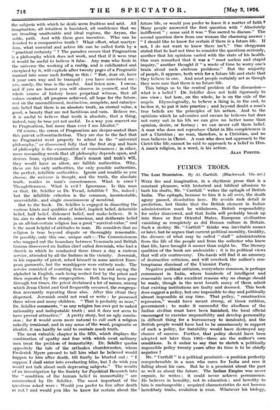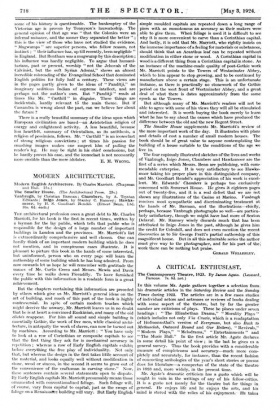FIIIMUS TROES.
The Lost Dominion. By Al. Carthill. (Blackwood. 15s. net.)
WITH fire and imagination, in a rhythmic prose that is a constant pleasure, with historical and biblical allusions to barb his shafts, Mr. " Carthill " writes the epitaph of British India. The epitaph, because to him it is all over, the death agony passed, dissolution here. He avoids rash detail in prediction, but thinks that the British element in Indian administration must be withdrawn, British responsibility for order disavowed, and that India will probably break up into three or four Oriental States, European civilization vanishing as completely as did Roman culture in Britain. Such a destiny Mr. " Carthill " thinks was inevitable sooner or later, but he argues that current political morality, timidity, the divorce of what may be called " staff " administration from the life of the people and from the collector who knew that life, have brought it sooner than might be. The literary qualities of the book are undeniable ; it is its political views that will stir controversy. Die-hards will find it an armoury of destructive criticism, and will overlook the author's con- temptuous dismissal of the Unionist Party.
Negative political criticism, everywhere common, is perhaps commonest in India, where hundreds of intelligent and reasonable men offer excellent reasons why no change should be made, though in the next breath many of them admit that existing institutions are faulty and doomed. This book does suggest a policy, but one impossible to-day and politically almost impossible at any time. That policy, " constructive repression," would have meant strong, at times ruthless, government ; to make it successful the aloofness of the Indian civilian must have been banished, the local official encouraged to exercise responsibility and develop personality (a difficult thing for a bureaucracy to inculcate), and the British people would have had to be unanimously in support of such a policy, for instability would have destroyed any chance of success. Further, that policy should have been adopted not later than 1905—these are the author's own conditions. Is it unfair to say that to sketch a politically impossible policy twenty years after its time is to be chiefly negative ?
Mr. " Cartbill " is a political pessimist—a position perfectly comprehensible in a man who cares for India and sees it
falling about his ears. But he is a pessimist about the past as well as about the future. The Indian Empire was never organic, he writes ; it could never achieve permanence.
He believes in heredity, not in education ; and heredity to him is unchangeable ; acquired characteristics do not become hereditary traits, evolution is over. Whatever his biology, some of his history is questionable. The bankruptcy of the Victorian age is proven by Tennyson's laureateship. The general opinion of that age was " that the Colonies were an infernal nuisance, and the sooner they separated the better " ; this is the view of those who have not studied the evidence. " Mugerumps " are superior persons, who follow reason, not instinct ; " their influence has, up till recently, been negligible " in England. But Bentham was a mugwump by this description ; his influence was hardly negligible. To argue that humani- tarians, past or present, worship " not the Jehovah of the Calvinist, but the soft Syrian Adonai," shows an almost incredible misreading of the Evangelical School that dominated English politics for fully half a century. These views are in the pages partly given to the ideas of " Panditji," an imaginary seditious Indian of supreme intellect, and are perhaps not the author's own. But " Panditji " reads at times like Mr. " Carthill " in disguise. These things are incidentals, hardly relevant to the main theme. But if Cassandra is wrong about the past, can we believe her about the future ?
There is a really beautiful summary of the ideas upon which European civilization are based—an Aristotelian religion of energy and enlightened activity. A less beautiful, because less heartfelt, summary of Orientalism, as its antithesis, a religion of pessimism, follows. Mr. " Carthill " is an iconoclast of strong religious convictions ; at times his passion for smashing images makes one suspect him of pulling the reader's leg. He may be right in his chief conclusions, but he hardly proves his case, and the iconoclast is not necessarily















































 Previous page
Previous page